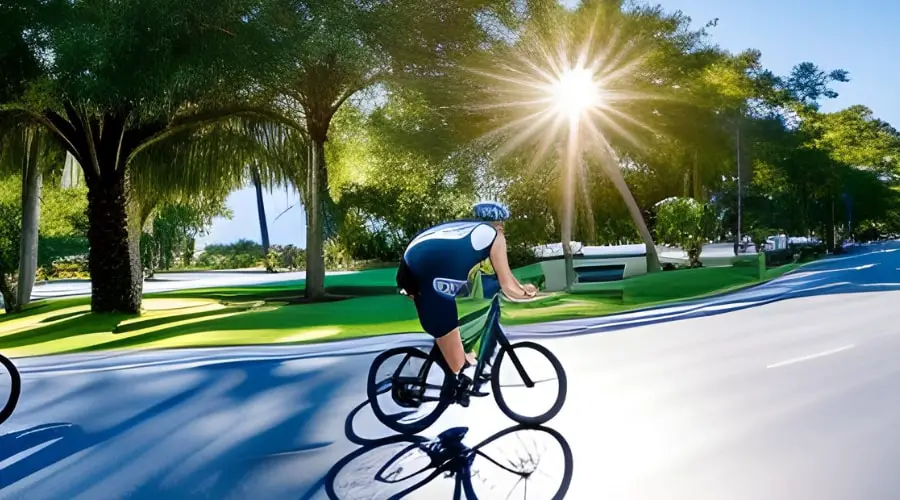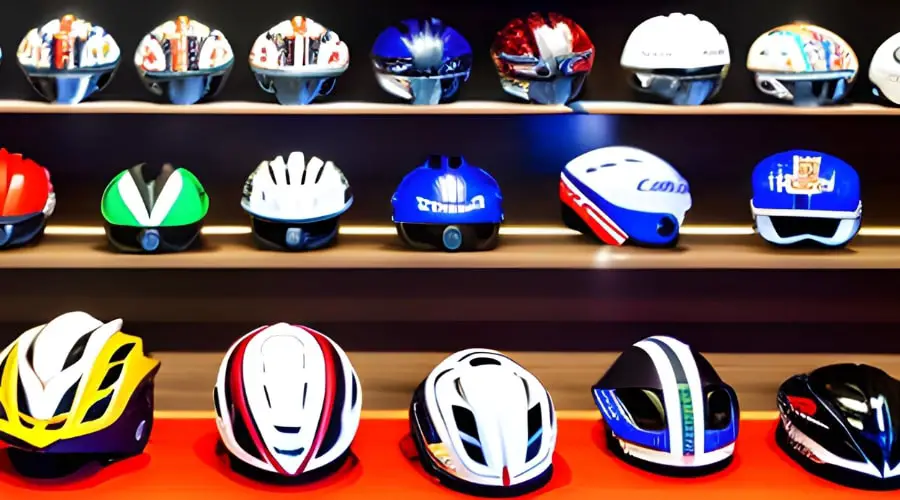Riding a bike is an excellent way to stay healthy, save money on transportation, and reduce your carbon footprint. But as you take to the streets of Florida, you may wonder if wearing a helmet is a legal requirement. In this article, we’ll discuss Florida’s helmet laws, the importance of wearing a helmet, and the potential consequences of riding without one. We’ll also provide tips on choosing the right helmet and debunk some common misconceptions about them.

Florida Helmet Laws
The Basics
In Florida, the law regarding bicycle helmets is pretty clear. According to Florida Statute 316.2065, bicycle riders and passengers under the age of 16 are required to wear a helmet that meets federal safety standards. This law applies to anyone riding on a public road, bike path, sidewalk, or any other area where bicycles are permitted.
Age Requirements
While Florida law requires riders under 16 to wear a helmet, there is no such requirement for adults. However, it’s important to note that wearing a helmet is always recommended for safety reasons, regardless of your age.
Why Helmets Are Important
Safety Considerations
Helmets are designed to protect your head in case of a crash or fall. They work by absorbing and distributing the force of impact, reducing the risk of severe head injuries or even death. When you wear a helmet, you’re taking a simple yet crucial step to protect yourself while enjoying your favorite outdoor activity.
Statistics and Studies
Numerous studies have shown that helmets can significantly reduce the risk of head injuries. According to the National Highway Traffic Safety Administration (NHTSA), helmets are 85-88% effective in preventing brain injuries. Additionally, the Insurance Institute for Highway Safety (IIHS) found that helmet use reduces the odds of a head injury by 50% and the odds of a head, face, or neck injury by 33%.
Helmet Requirements in Other States
While Florida only requires riders under 16 to wear helmets, other states have different laws. Some states mandate helmet use for all cyclists, while others have no requirements at all. It’s important to familiarize yourself with the laws in your state and any states you plan to visit while cycling.
How to Choose the Right Helmet
Fit and Comfort
A helmet that fits well and is comfortable will be more likely to be worn consistently. Make sure to try on several helmets and choose one that feels snug but not too tight. The helmet should sit level on your head, and the straps should be adjusted to fit securely under your chin.
Safety Standards
Always look for a helmet that meets safety standards set by organizations such as the Consumer Product Safety Commission (CPSC) or the Snell Memorial Foundation. These certifications ensure that the helmet has undergone rigorous testing and will provide adequate protection in the event of an accident.
Price vs. Quality
While it may be tempting to purchase a cheaper helmet, investing in a high-quality one can be a life-saving decision. Look for helmets that have good ventilation, are lightweight, and have strong construction. Remember that a well-made helmet is an investment in your safety and well-being.
Common Misconceptions About Helmets
Some people believe that wearing a helmet can cause more harm than good, arguing that it can lead to neck injuries or create a false sense of security. However, studies have consistently shown that helmets significantly reduce the risk of head injuries without increasing the risk of neck injuries or promoting reckless behavior.
Helmet Usage in Professional Cycling
Professional cyclists understand the importance of wearing helmets. In fact, many major cycling events, such as the Tour de France, require all participants to wear helmets. This not only emphasizes safety in the sport but also sets a good example for recreational cyclists.
Tips for Encouraging Helmet Use
To promote helmet use among friends and family members, consider the following tips:
- Lead by example: Always wear a helmet yourself when cycling.
- Educate others about the benefits and importance of wearing a helmet.
- Encourage children to wear helmets from a young age, making it a habit.
- Praise and reward children for wearing helmets consistently.
- Help others find a comfortable and well-fitting helmet that they will enjoy wearing.
Legal Consequences for Riding Without a Helmet in Florida

In Florida, if a cyclist under the age of 16 is caught riding without a helmet, the parents or guardians may be fined up to $15. Additionally, the child may be required to complete a bicycle safety course. While there are no legal consequences for adults riding without a helmet, it’s important to remember that wearing one can help prevent serious injuries.
FAQs:
Do Florida’s helmet laws apply to electric bicycles?
Yes, Florida’s helmet laws apply to both traditional bicycles and electric bicycles if the rider is under the age of 16.
Can I be held liable if I’m in a bicycle accident and wasn’t wearing a helmet?
While not wearing a helmet may not result in a fine for adults, it could potentially impact a personal injury case. A court may find that you were partially responsible for your injuries if you weren’t wearing a helmet during an accident.
What should I do if my helmet is damaged in an accident?
If your helmet is damaged in an accident, it’s essential to replace it. Even if the damage is not visible, the helmet’s ability to protect you in another accident may be compromised.
How often should I replace my bicycle helmet?
Generally, it’s recommended to replace your helmet every three to five years, even if it hasn’t been involved in an accident. Over time, the materials can degrade, reducing the helmet’s effectiveness.
Are helmets required for skateboarders or scooter riders in Florida?
Florida’s helmet laws specifically apply to bicycles and electric bicycles. While helmets are not legally required for skateboarders or scooter riders, wearing one is still highly recommended for safety reasons.
Can wearing a helmet reduce my insurance premiums?
Some insurance companies offer discounts or incentives for policyholders who consistently wear helmets while cycling. Check with your insurance provider to see if they have any programs or discounts related to helmet use.
Do I need to wear a helmet when using a bike-share program?
While Florida law does not require adults to wear helmets when using bike-share programs, it’s always a good idea to wear one for your own safety. Some bike-share companies may provide helmets for users, or you can bring your own.
Are there any exceptions to Florida’s helmet law for religious or medical reasons?
Florida’s helmet law does not provide specific exemptions for religious or medical reasons. However, if you believe that wearing a helmet would infringe on your religious beliefs or pose a medical risk, it’s advisable to consult with a legal professional to discuss your options.
Conclusion
In summary, it is not illegal for adults to ride a bicycle without a helmet in Florida. However, riders under the age of 16 are required to wear one. Regardless of the law, wearing a helmet is always a smart choice to protect yourself from potential head injuries. Invest in a quality helmet, encourage others to do the same, and always prioritize safety while cycling.
Helmetslab is a website that focuses on providing in-depth reviews and information about different types of helmets, including motorcycle helmets and others helmets. I am writing a post with proper research on the info that helps helmet users.
